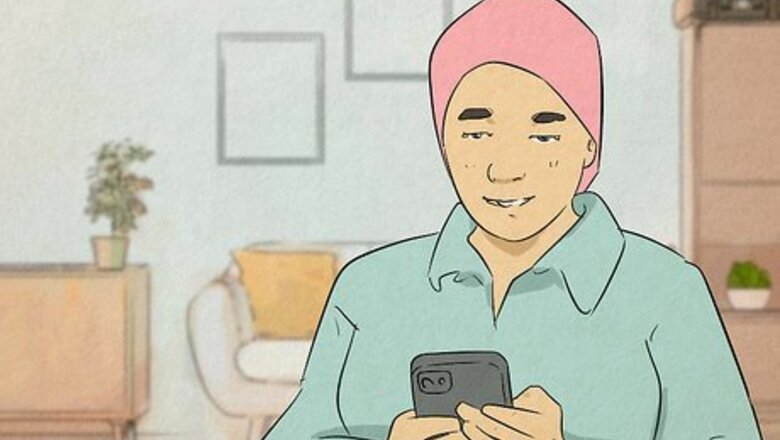
views
Expect the best.
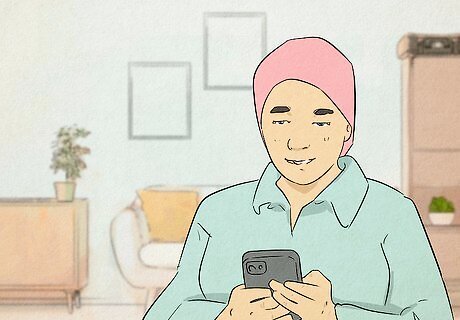
Remind yourself that the person is probably just busy. In most cases, people are just caught up in their daily lives and can't answer texts right away. Ask yourself if you actually know their schedule. There could be some time commitments you aren't aware of. Here are a few other reasons for a delayed response: They want to give you a longer response but can’t right now. They put their phone away to focus on work or school. They accidentally forgot to reply. Maybe they thought about what they wanted to say but didn’t actually text it.
Resist the temptation to double-text.
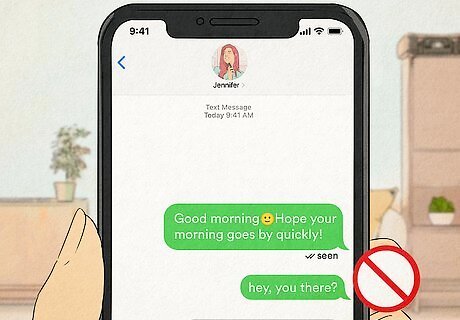
Give them a little space so they have a chance to reply. If you send a lot of follow-up texts, it’ll be hard for them to keep up and they might get overwhelmed. Leave them with just one text to catch up on—the other person will probably appreciate your patience. If they just have one recent text from you, they’ll be able to respond more easily once they have time.
Read over your previous messages.
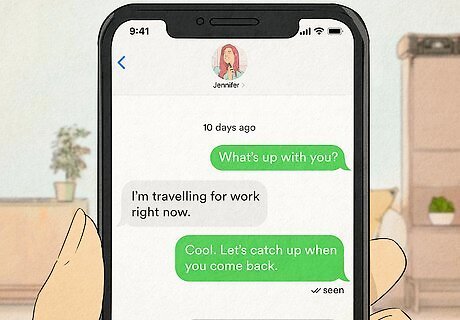
See if there are any confusing texts that you need to clarify. It’s okay if you review your message again and notice that it might’ve been a little vague—it happens! You might feel relieved because you found something that was easy to misread. Some common situations that can come up might look like: You told them you’d love to see them again. They might just think you two will make plans sometime soon. They mentioned they’re traveling and you said you’d like to catch up when they come back. They might think you’d rather talk in person. You asked them a thoughtful question. They might think you want them to spend more time coming up with an answer.
Look for patterns.
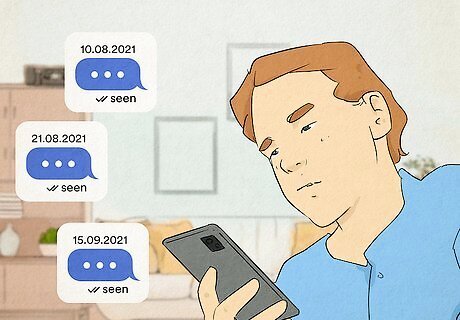
Instead of focusing on one text, think back to other interactions. Do they usually give you their full attention or do they always leave you on “read”? Do you feel like you can reach out to them and talk about a problem? If they’re usually consistent with their responses, great! If they leave you waiting around a lot but eventually get back to you, periods of silence might just be normal for them. Decide if their explanations feel valid. For example, maybe they recently mentioned that work or school has been super stressful for them lately. You can also set some limits and boundaries. For instance, if they constantly hit you up at random times, remind yourself, “Their patterns make it obvious that I need someone who’s consistent in my life.” Ask your friends if they’ve noticed any patterns, too. They might have picked up on something you missed.
Get in touch with your feelings.
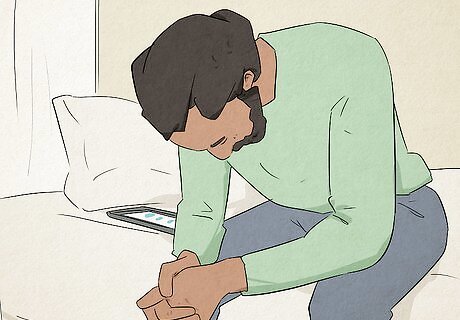
Ask yourself why being left on “read” frustrates or confuses you. A delayed response gives you a great opportunity to learn more about yourself. First, identify the emotion you’re experiencing and pay attention to how it feels in your body. Then, reflect on why you react this way when you’re left on “read.” Finally, describe the connection you feel with the other person right now. Your three-step process might look something like: “The emotion that comes up for me is anxiousness, and it feels like a knot in my stomach.” “The reason I’m worried when I’m left on ‘read’ is that I think that my message doesn’t matter to them.” “I’m not sure how close we are. I would feel better about our connection if I knew they valued what I have to say.”
Put your phone away.
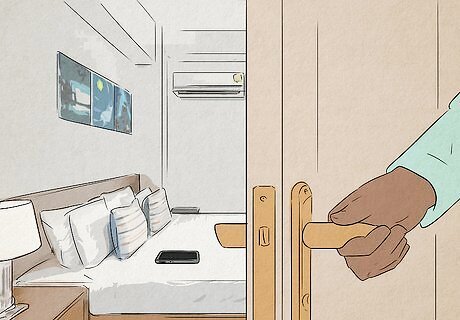
Keep it out of sight and get some peace of mind. It's easy to be distracted by your phone, especially if you're waiting to hear back from someone. If you get your mind off any notifications, you’ll free up a lot of mental energy. You’ll also be able to brainstorm new ways to spend your time. Try catching up with friends with apps on your tablet or a laptop. Studies show that your problem-solving skills improve if your phone can’t distract you, so take on a challenging new task!
Go outside.

The beauty of nature can help to balance your mood. If you keep running through texts in your mind, your whole world can feel like it revolves around one person. Get some fresh air and admire the scenery around you. Your stress levels will go down when you get lost in the present moment, and you'll probably stop focusing on details from the past. Studies show that many people spend over 10 hours on devices per day. You’ll cut down on all that screen time if you get outdoors. Research has found that “green spaces,” like forests and parks, will lift your mood, so head anywhere with lots of trees and flowers! Bring a journal and some art supplies with you—you can write about what inspires or moves you, like seeing a hummingbird fly over wildflowers.
Get active.
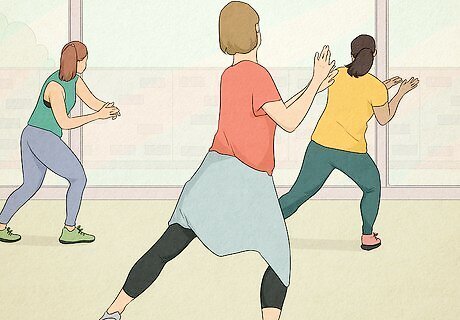
Exercise relieves your stress and keeps you focused on your movement. If you throw yourself into a routine you really like, such as yoga or strength training, you’ll enter a “flow state,” which happens when all you think about is one activity. It’ll take so much concentration that you won’t even think about a text or “read” receipt. Instead of reading texts, look up videos of new exercise routines. Visit a VR arcade to dive into some video games and get active at the same time. Activity also releases endorphins, chemicals that lift your mood and help you forget anything you’re worried about.
Hang out with friends.

Your social network will remind you that you’re valued. When you accept invites or bring up fun things to do, you’ll notice that people love your company. You might even find you prefer reaching out to your buddies instead of anyone you’ve been waiting to hear back from. Throw a party or go to a small get-together and turn off the notifications on your phone. Join a meetup group geared toward a hobby, like hiking. You’ll be able to bond with others over a common interest. Attend a community event or a volunteer program. You’ll get in touch with kind and compassionate people. Explore a new interest, such as cooking or dancing. You’ll be able to practice with others—some might be able to show you a thing or two!
Read a book.

Lose yourself in a good story and any worries will melt away. All the words on the pages of a book push away thoughts about the convo. Choose any genre that you enjoy and can get lost in. Spend the day cozying up with your favorite drink and some inspiring fiction or nonfiction. If you like sci-fi or fantasy, stories about heroism can feel really empowering and make you think about what you want to accomplish. Self-help books are also great because you'll think a lot about personal growth and development. Some psychologists call reading "bibliotherapy" because it calms you down no matter what you're going through.
Binge-watch a show.

The lives of fictional characters can be way more entertaining than texts. If you choose a series with a bunch of episodes, you might get really hooked on the storyline. When you follow the plot and try to figure out the ending, you may not even wonder what could pop up on your phone. You may feel more reassured since there will definitely be some questions answered by the end of the show. Research shows that binge-watching can “transport” you to a “narrative,” which means you’ll forget about your own life and focus on what’s happening on screen. Studies also suggest an interesting show can lift your mood and replace negative emotions, like nervousness, with positive ones, like happiness.
Move on if they don't respond within 3 days.

That’s enough time to let go and forget about them. Since “ghosting” is a pretty common concern, people who want to communicate tend to reach out within a few days (even just to let you know that they're busy). If they haven’t given you a heads up after a few days, it’s probably best to just move on. Remind yourself that you put effort into the convo and gave them the appropriate amount of space. They still might get back to you, and that’s totally fine! If they reply after 3 days, check in with yourself and see if you actually want to talk to them. If they never respond, don’t take it personally. Remind yourself that they saved you time—now you’ve learned that your communication patterns just don’t match up.
Remind yourself of your great qualities.

Celebrate your own value and remember that you’re a gift. If you had to put a text convo behind you, just remember it doesn’t tell the whole story about who you are. It was one random situation, and that person just didn’t get to know you really well. You know yourself perfectly, though! Give yourself a little pep talk that might look something like: “I’m a ton of fun to be around. My friends say I’m a blast and tell the greatest jokes—who am I to argue with them?” “I have a huge heart. I love supporting others and making sure they feel seen.” “I’m a thoughtful person. I always want to know what’s on someone’s mind and how I can help.”



















Comments
0 comment